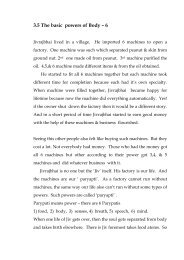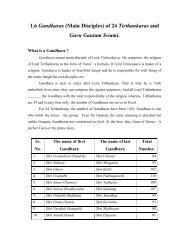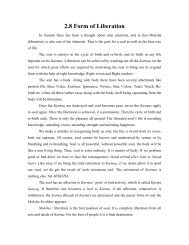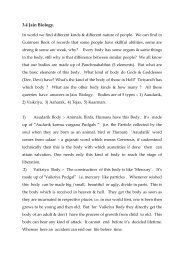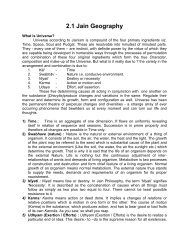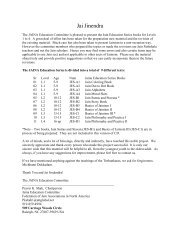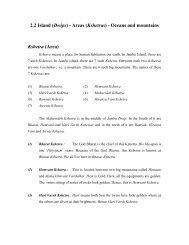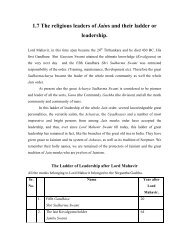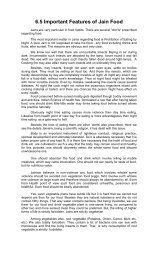Duties of householders. - Jainism, Jain Religion - colleges
Duties of householders. - Jainism, Jain Religion - colleges
Duties of householders. - Jainism, Jain Religion - colleges
You also want an ePaper? Increase the reach of your titles
YUMPU automatically turns print PDFs into web optimized ePapers that Google loves.
6.1 Which are <strong>Jain</strong> Achars? <strong>Duties</strong> <strong>of</strong> <strong>householders</strong>.<br />
According to Hindu belief, Nirvān can be achieved by following any <strong>of</strong><br />
these three paths viz. Dharma, Devotion (¼Âõík), Knowledge (¿kkLk). According to<br />
<strong>Jain</strong> Philosophy there are 3 jewels which are to be followed viz.<br />
1. Rational (Right) Conduct (MkBÞf [krhºk)<br />
2. Rational (Right)World-view (MkBÞf ËþoLk)<br />
3. Rational (Right) Knowledge (MkBÞf ¿kkLk)<br />
The <strong>Jain</strong> unified path to Mokshā need All Three. For a <strong>Jain</strong>, Mokshā is a<br />
final reaching point, where soul becomes free from pains <strong>of</strong> birth and rebirth. It is<br />
a state <strong>of</strong> permanent liberation.<br />
What path a <strong>Jain</strong> Householder – (Shravakā -Shravikā follow) to attain Mokshā.<br />
One needs a firm determination and great amount <strong>of</strong> self discipline. Both<br />
determination and self- discipline spring from taking <strong>of</strong> vows – Ãk[õ¾ký. The lay<br />
persons <strong>of</strong> <strong>Jain</strong> <strong>Religion</strong> – Popularly now known as Shravakā and Shravikā are<br />
advised to take introductory vows and they are advised to practice self –<br />
restraint. The partial self restraint is known as Das Virti (Ëþ rðhrík) and the total<br />
restrain is known as Sarvāvirti (Mkðo rðhrík). However, it may not be possible for all<br />
the lay <strong>Jain</strong> followers to take even the introductory vows due to several personal<br />
and social responsibilities and limitations. Such persons however follow the<br />
principles and practices to the best <strong>of</strong> their ability. From this practice, the<br />
‘Pratyakhyanā’ or ‘ Pachakkhanā’ concept has been started, according to which<br />
the vows for limited time period even for a day or few hours are taken and<br />
followed e.g. Fast for a day or Ekasana (only one meal a day) Biyasanā (Only<br />
two meals a day) etc. This is an attempt to balance between the domestic routine<br />
life vis-à-vis desire to live more devoted life. Even attempting such small small<br />
vows can bring a peaceful and stress-free life to its followers, besides, bringing a<br />
new harmony in the society.<br />
The <strong>Jain</strong>s emphasis on self-control; and all such practices <strong>of</strong> self-control<br />
are incidentally promoting better health. Some <strong>of</strong> the practices are;<br />
Vegetarianism : This is most important practice <strong>of</strong> <strong><strong>Jain</strong>ism</strong> and is directly<br />
related to principle <strong>of</strong> Non- violence. Any Non Vegetarian<br />
food involves violence, may it be meat, egg, fish etc. Any<br />
such food is totally and completely forbidden for <strong>Jain</strong>s.<br />
Even among vegetables, the root vegetables also contains<br />
large number <strong>of</strong> germs, and therefore all root vegetables are<br />
also forbidden for <strong>Jain</strong>s. <strong>Jain</strong>s do believe, and strongly<br />
believe, that even vegetables have life; therfoer they have<br />
limited the consumption <strong>of</strong> vegetables too. <strong>Jain</strong>s’ concept<br />
and belief in vegetarianism is very subtle and very scientific.<br />
Periodic Fasting (Upvasā) Everybody cannot remain on fast-some people find it<br />
difficult to follow. But they can follow. Unodari (Consuming<br />
little less then one usually eats) If you eat, 4 Chapaties,<br />
regularly so in Unodari you take 3 Chapaties. This also<br />
helps to gain self control, and any body can easily practice it.<br />
Boiled Water In <strong><strong>Jain</strong>ism</strong> there is special significance <strong>of</strong> boiled water.<br />
During any Vrat consumption <strong>of</strong> boiled water is compulsory.<br />
But some <strong>Jain</strong>s even without any vow or Vrat prefer to use<br />
only boiled water. The reason is simple, Water contains a lot<br />
many germs, not seen with eyes. But science has proved it<br />
in laboratory. On a microscope, a single drop <strong>of</strong> ordinary<br />
water would show thousands <strong>of</strong> living germs in it. They harm<br />
your body from within. Boiled water is sate water. All the<br />
germs are killed and no new germs can be born in it. Thus it<br />
is most safe water.<br />
Eating before sunset A strict <strong>Jain</strong> would never take any food after sunset.<br />
Indeed this practice from health pint <strong>of</strong> view, provides<br />
sufficient time for food to digest. But from non-violence point<br />
<strong>of</strong> view also it has special significance. After sunset, in the<br />
dark, a number <strong>of</strong> bacteria are generated in food- items.
Even small unseen insects are likely to contaminate the food<br />
items. Therefore taking food after sunset is considered to be<br />
as bad as Non-Vegetarian food. “To take the food at night<br />
(after sunset) is gate way to Hell.”<br />
All these practices are related to food and health. But for a<br />
<strong>Jain</strong>, there are several practices for peace <strong>of</strong> mind.<br />
Prayers and Worship There is great significance for a <strong>Jain</strong> to worship God/<br />
Tirthankara in temple and Guru (a monk) in an Upashrayā.<br />
In order to give thanks for or appreciation for their grace and<br />
to draw spiritual inspiration from them most <strong>Jain</strong>s daily visit a<br />
temple, humbly bows down, <strong>of</strong>fer Pooja with several<br />
substances like Sandal Saffron Paste, Flowers, fruits, Rice,<br />
Sweets and <strong>of</strong> course Money. The Worship (Vandanā) to<br />
Guru (a monk) is meant for one’s appreciation <strong>of</strong> the life he<br />
leads.<br />
Forgivness (Khshama Yachana) This is also a great practice <strong>of</strong> <strong><strong>Jain</strong>ism</strong>. The<br />
principle <strong>of</strong> Non-Violence has been taken to such an<br />
extreme, that even doing something bad, or telling<br />
something unpleasant creates a subtle violence. So a true<br />
<strong>Jain</strong> always repents for his misdeeds and asks for<br />
forgiveness;<br />
‘¾k{ur{ MkÔð Sðu, MkÔð Sðk ¾{tíkw {u<br />
r{r¥k {u MkÔðk ¼qðuþw, ðuht {ßs Lk fu Lk®n’<br />
This is the real spirit. Ask for forgiveness for whatever you<br />
have done in present or past, knowingly or unknowingly.<br />
Meditation (Sāmāyik) Sāmāyik is a meditation for 48 minutes; during which a<br />
devotee, keeps himself / herself totally devoid <strong>of</strong> the worldly<br />
activity which is for better for soul. Sāmāyik . literally means ‘<br />
aspiring for liberation through equanimity’. For the period <strong>of</strong><br />
48 minutes, the devotee is detached from all external<br />
activities. This is considered to be the highest form <strong>of</strong><br />
religious discipline; and is widely recommended by monks<br />
and nuns, and equally widely practiced by <strong>Jain</strong> men, women<br />
and children.<br />
Confession (Pratikramān) Pratikramān is another religious discipline in which<br />
the <strong>Jain</strong>s repent for their sins and misdeeds done to one and<br />
all. This is a activity to make the mind clean with repentance,<br />
and soul light with a sense <strong>of</strong> forgiveness. Pratikramān is an<br />
act <strong>of</strong> genuine introspection <strong>of</strong> one’s total activities. During<br />
the course <strong>of</strong> moral life, we knowingly and unknowingly,<br />
directly or indirectly, commit a number <strong>of</strong> <strong>of</strong>fences – by mind,<br />
by speech or by action. Pratikramān is a time when one<br />
reminds oneself <strong>of</strong> such <strong>of</strong>fences done to others – to any<br />
body human species, all other inferior species, plants and<br />
what not. If with a clear conscious, we beg pardon for such<br />
misdeeds the sins are washed away and soul becomes light<br />
and pure. It requires great amount <strong>of</strong> humility.<br />
Pratikramān is <strong>of</strong> 5 kinds depending upon the duration <strong>of</strong><br />
period covered for confession and accordingly, the rituals<br />
change.<br />
1. Rai Pratikramān Confession for misdeed during night.<br />
2. Devsi Pratikramān Confession for misdeeds during a day.<br />
3. Pakkhi Pratikramān Confession for misdeed in 15 days.<br />
4. Chaumasi Pratikramān Confession <strong>of</strong> misdeed in 4 months.<br />
5. Sāmvatsari Pratikramān Confession <strong>of</strong> misdeed in whole year.




